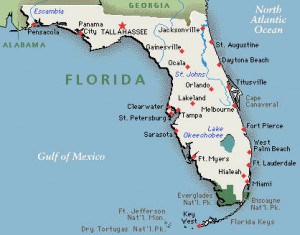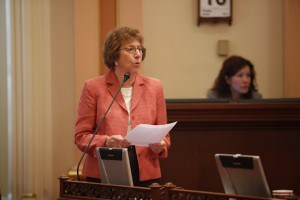 Connected Nation, a broadband advocacy group with ties to some of the nation’s largest telecommunications companies, is accused of rewriting a Florida state budget amendment to divert proceeds from a federal broadband grant to itself.
Connected Nation, a broadband advocacy group with ties to some of the nation’s largest telecommunications companies, is accused of rewriting a Florida state budget amendment to divert proceeds from a federal broadband grant to itself.
A growing scandal over broadband map funding and allegations of political maneuvering and favoritism has now extended into the offices of several state Republicans now accused of doing the group’s bidding to change funding allocations in ways that could ultimately threaten Florida’s broadband grants.
Connected Nation’s involvement in the state’s broadband expansion efforts began in earnest in 2009 when the group won a $2.5 million contract to map broadband availability in Florida. A follow-up federal grant for $6.3 million to extend broadband deployment brought the group’s lobbyists back to Tallahassee to secure a “no-bid shot” at that new money for itself, which turned out to be a big surprise to the Department of Management Services, the Florida state agency charged with overseeing the project.
 The grant award mandated that money be spent on additional broadband mapping and broadband expansion specifically for libraries and schools. When DMS hired contract employees to manage the project for the next two years, Connected Nation declared war on the effort, considering it their turf.
The grant award mandated that money be spent on additional broadband mapping and broadband expansion specifically for libraries and schools. When DMS hired contract employees to manage the project for the next two years, Connected Nation declared war on the effort, considering it their turf.
The Miami Herald called the lobbying battle that then ensued as “an audacious display of lobbying clout [that] got the Legislature to force DMS off the contract and steer the grant to [Connected Nation] instead.”
The newspaper reports the end effect of the bitter feud is a less than useful broadband mapping operation and a threat from the federal government it will yank back what remains of the grant money if things do not improve… quickly.
Connected Nation told the newspaper it defends its position as creating value for taxpayers and citizens. But the group also openly admits its broader goal is to increase broadband usage, which directly benefits its telecommunications partners, which the newspaper says includes AT&T, Verizon, and Comcast.
DMS officials are just as willing to play hardball in the statewide dispute, accusing Connected Nation of producing erroneous broadband maps and being responsible for “repeated performance problems.” They announced last year they would not renew Connected Nation’s contract.
Political observers note DMS probably did not realize who they were dealing with, and Connected Nation’s high powered lobbyists descended on the state capital to pull the rug completely out from under DMS, yanking the entire project away from the state agency and assigning it to another.
With the help of several Florida Republican legislators and the governor, DMS found itself without a broadband project, as lawmakers transferred it to Florida’s new “Department of Economic Opportunity.” The ultimate decision approving the transfer of broadband matters to an agency that suggests an allegiance to the private sector came from Florida’s governor Rick Scott.
The governor’s office muzzled DMS protestations. Marc Slager, deputy chief of staff for Gov. Rick Scott, acknowledged to the Herald he told DMS to stand down because “we don’t need to have different people from the governor’s agencies advocating an issue.”
Revenge is a dish best served cold, and Connected Nation is not through paying back DMS for interfering in their Florida plans to capture broadband grant funds. The group is taking its time working with several Republican legislators to cut more legs out from under the government agency.
With respect to the $6.3 million broadband expansion grant, the newspaper reports Connected Nation last year simply rewrote a state budget amendment, inserting themselves as the grant winner.
“Attached is a document that reflects conversations we’ve had with Chairman Weatherford, the draft language is consistent with the bill, and it is language we believe the [Legislative Budget Commission] would approve,” wrote Alli Liby-Schoonover, from Connected Nation’s lobbying firm, Cardenas Partners, in February 2011, making the change.
What a broadband mapping group was going to do with the money intended to wire schools and libraries remains unknown.
This year, Connected Nation enlisted the support of Rep. Doug Holder, a Sarasota-area Republican, to follow through on an earlier threat to disassociate DMS completely from Florida’s broadband expansion efforts. Holder eagerly wrote legislation, at the request of Connected Nation’s lobbyists, to get broadband away from the state agency, arguing to do otherwise was “expanding government.”
“The idea of a government agency taking a program that could be administered by a private entity that could create revenue in the private sector was wrong,” he said.
The newspaper asked Holder whether the spending was worth it if Connected Nation continued its record of creating no new jobs for Florida. Holder answered he would have to think about whether or not they should get the contract.
The ongoing tug of war is being watched by un-amused officials in Washington.
The state Republican effort to recast the project as an “economic development” effort may fall well short of the grant requirements because the term lacks specificity, warned Anne Neville, director of the State Broadband Initiative in the U.S. Dept. of Commerce. Neville added that any changes significant enough to repurpose funds would cause the grant to be canceled, with funds returned to the treasury.


 Subscribe
Subscribe









